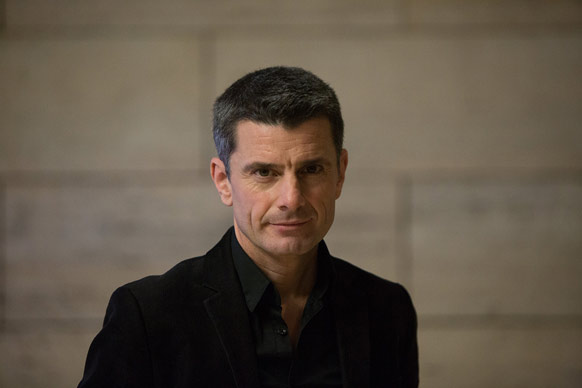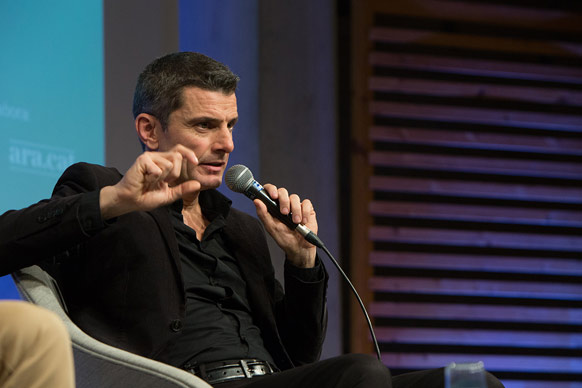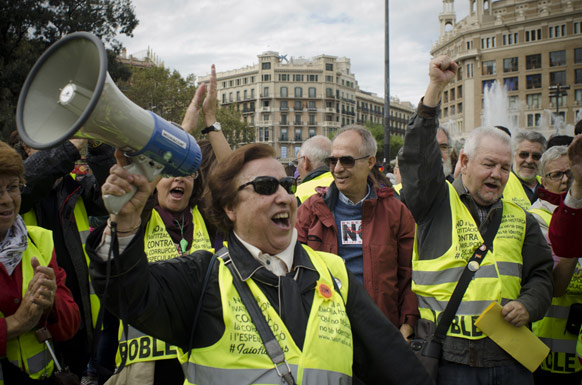
Pedro Olalla. © CCCB, 2017. Author: Miquel Taverna.
Writer Pedro Olalla has profound knowledge of Greece. In recent years, he has been a reporter on the life of Greek citizens, who are impacted by the economic crisis and the drastic financial decisions of the European Union. For that reason, and for his background as a Hellenist, which makes him well acquainted with the culture and politics of ancient Greece, Olalla is one of the most informed interlocutors to discuss the meaning of Europe and of democracy. Pedro Olalla visited the CCCB to give a talk titled “The Old Future of Democracy“, and journalist Anna Punsoda interviewed him. In this talk, they comment on the future of an aged continent, on the credibility of European bureaucrats, and on the ability and the responsibility to make decisions that we all have in a democracy.
Anna Punsoda: You believe that direct citizen participation is key to improve the quality of a democracy. In a parliamentary democracy like ours, do I not have the right to delegate my voice on the representatives and forget about public affairs?
Pedro Olalla: [Laughs] Not only do you have the right, but it is virtually the only thing you can do. However, if we give up our involvement in public affairs, we are giving up democracy altogether. You are right that our democracies are representative, but to a dubious extent. Who are our alleged representatives really representing? Democracy, deontologically understood, is based on a high degree of identification between the governors and the governed. And this premise is not met: the distancing between them and us keeps increasing.
Anna Punsoda: Identification? Doesn’t Plato distinguish between three kinds of men, among which the governors would be those in whom the influence of reason is predominant?
Pedro Olalla: In his Republic, Plato was describing an ideal model, not portraying what Athenian democracy was like. Democracy, as a system, is based on engagement, because it aims to bring political power as close as possible to the citizens. If the citizen does not want to exercise that power, if the citizenry as a whole gives up its sovereignty, there will always be someone willing to take over, and possibly they will not be pursuing the general interest. Given that we will not be able to have the full administration of common affairs, if we want to improve our democratic health, we must demand a greater degree of control over what our representatives do. We must demand that our democracies establish mechanisms so that citizens can, through the citizens themselves (and not through professional politicians with party affiliations), fulfil their role of controlling their representatives, following them and removing them from office if they are not working for the general interest.
Anna Punsoda: Isn’t defending your own party the best way to defend democracy?
Pedro Olalla: I don’t think so. For the most part, parties defend sectorial interests, which, to a large extent, condition their existence. In its origins, democracy did not have parties, but our current democracies did not genetically evolve from the original model, the Athenian (which is the one we know the best, thanks to the historical records of Aristotle, Demosthenes, Isocrates and so on). Our democracies stemmed from Roman republicanism, which already in its early days was a representative system, a res publica, a management system to regulate common affairs based on the cursus honorum (course of offices), in which patricians had a considerable privilege. The responsibilities that in Athenian democracy belonged to the Assembly, in Rome fell under the Senate, the consuls and the magistrates —the system was more similar to the current one.
The liberal tradition, which starts with Locke and influences the republic models created after the French and the American revolutions, was a good foundation. That modern republicanism has a promising start, because liberalism back then was a struggle against absolutism, a struggle that sought to give sovereignty back to the people, to respect individual freedoms in the face of the abuses of absolutist power —inherited by bloodline— that monarchic empires represented. But, during a second stage, these new republics shifted towards a defence of the emerging bourgeoisie’s class interests. That is why they came to be known as “bourgeois republics”. From its initial humanist and political spirit, liberalism took a turn towards a sense of economic protectionism, defending the interests of one social class. Political parties were born in that context, during that republicanism, because they are the adequate expression to defend class interests. Our current democracies have inherited this “neorepublican” model. That is why we think parties are the only way to have popular representation. We find them to be natural components of democracy, but they are not, they are a part of its history and, if we are a bit rigorous about it, of its recent history.
Parties have shown that they have certain internal hierarchies, certain promotion mechanisms, which are funded by lobbying groups and serve opaque interests. They block the political scene, avoiding the entrance of smaller groups and adopting a set of attitudes that are obstacles to a true democracy. In order to revitalize democracy, we must demand alternative paths of participation in the decision-making processes.

Pedro Olalla. © CCCB, 2017. Autor: Miquel Taverna.
Anna Punsoda: To what extent is it possible for modern nation states to organise themselves like the Athens of Demosthenes?
Pedro Olalla: Well, it’s not about copying —which is obviously not possible, because Athens had a population of 200,000 people at that point in time. But we must be aware that, back then, it was possible to develop formulas and models that managed to provide the citizens with a political weight that they have not had ever since in history. And they reached that scenario with the means at their disposal, without references from the past, from scratch. How is it, then, that we are not able to regulate formulas to achieve a greater degree of involvement? If we can vote for Eurovision’s winning song in real time, how can we not have a referendum, no matter how large the electorate is? Demography should not hinder the development of formulas that allow for greater citizen participation. That does not mean that a nation state of today has to act with the same tools and parameters that were used in Athenian democracy. However, it is a mistake to think that back then democracy simply came to be in a natural way and that today something similar cannot happen because it would be unnatural. To think that way is to deprive us of a more decent democracy. There are no natural obstacles that make it impossible for us to organise public life differently.
Anna Punsoda: You also speak in negative terms about the professionalisation of politics. When I look for a job, however, they analyse every single detail of my work experience. Why would public affairs require less professionalism than business affairs?
Pedro Olalla: You see, a sort of fallacy has become widespread according to which technical experience equates to political will. Through this fallacy, the population is denied the right to exercise their political will under the argument that they lack the technical experience. Well, do our political representatives have technical experience in all the fields over which they must make decisions? Do they not have their teams of consultants? Can they have an informed opinion on solar energy, geostrategic matters and school programmes? Obviously not, that is why they have their teams and consultants, but their actions are always moved by a political will (which, at times, is not even their own). In the Protagoras, Plato defined political will as a gift distributed across the whole of society. Therefore, we can either defend that it belongs to the whole of society, or we can accept that we lack political will and renounce our self-governance ambitions. If we believe that society as a whole can generate a degree of political will, we have to enable it to do so. It’s not right that, because on an individual level we lack the technical knowledge to make decisions across all the fields at stake, we have to delegate our political will on representatives who do not have that knowledge either and who, all too often, do not take the general interest into consideration in their decision-making. Most of the decisions that must be taken to govern a society are, in essence, ethical decisions —not merely technical—, and the citizenry as a whole is equipped to make them.
Anna Punsoda: Let’s move on to the European project. How is it possible to update it with a generation that has forgotten about the war and the need to find peace through union?
Pedro Olalla: War memory is one of the factors we should consider to assess the success of the European project’s consolidation, but it is not the most relevant one. The current European Union is an attempt to create de iure institutions to consolidate the political and financial power that, de facto, already belongs to certain instances. In reality, the Union’s bureaucrats are not fighting against the possibility of a future war, but rather to consolidate their oligarchic interests, which are opposed to the political and monetary sovereignty of the member states. They are also fighting to move the decision-making centres from national parliaments to supranational instances that are far from democratic. The European Parliament is nothing but the fig leave of the entire project, because the true decisions are not made by democratic institutions —the Commission itself is not a democratic institution, and it is very much subject to the pressure of lobbies. The political and economic group that was created cannot fulfil the old aspirations of Adenauer or Jean Monnet, because it follows other directions.
The Union has lost credibility, even though it is trying to maintain it by all means. When the perverse effects of the financial crises and the financial dependencies hit, we began to rethink the convenience of such a structure. We began to see how certain lobbies and political sectors —the neoliberal hard core— had progressively appropriated the project to grant themselves a de iure power that they had always been exercising de facto. This goes against our fundamental rights. The memoranda that these institutions forced Greece to sign over the last few years go against the Union’s original right, against International Law, against Human Rights (decent work, housing, health…), and against major social achievements (social security, collective agreements, eight-hour workdays, etc.). They are incompatible with the rule according to a higher law and with democracy.
Anna Punsoda: Is it a theft, rather than a collapse of the system?
Pedro Olalla: It has been an intentional act. The idea that things degenerate spontaneously and impersonally is false, but it has been the method devised to dilute concrete responsibilities into a collective responsibility. When certain laws are signed, when certain institutions are created, and when a treaty with Canada or the United States is signed, there are specific people to be held accountable; we cannot simply say, “That is how history goes”. The truth is that the western capitalist system has been triggering the two phenomena that humanity must avoid if it wants to survive: the accumulation of wealth in the hands of a few, and the accumulation of political power in the hands of a small minority. There are specific people, with names and surnames, who can be held accountable for that process.
Anna Punsoda: Another issue you talk about is how the system promotes a negative view of the old age.
Pedro Olalla: That’s correct. The terms in which the system of world domination expresses itself are still those of productivity. And the old age is seen as a marginal, subsidiary collective, a parasite of the State that is increasingly becoming a problem because it exists and grows. If we take this stance, we assume a position of weakness towards the system, because we will end up feeling guilty for living too long or for retiring. Politics should be something that stems from society to achieve happiness, and not an external system imposed to society and demanding that everyone adapt to serve it. If society changes —it grows older—, politics and the way we tackle problems will have to change as well. Guilt makes it impossible for us to evolve towards a political system that allows the elderly to live decently and as a part of society.
Anna Punsoda: It is often said that we grow more conservatives with time and that, as a consequence, certain parties have given up the possibility of politically addressing the old age.
Pedro Olalla: The notion that we become more conservatives and fearful with time has been induced by the system and must be reconsidered. Political mind-sets have much more to do with the life experiences of each generation than with age. The grandmothers at the Plaza de Mayo embody a progressive political view. And, conversely, neo-Nazi parties are filled with young people. We must leave aside age-related stereotypes to have a fairer view of each age group. And we must also put an end to the feelings of guilt and resignation. Elderly people must stop seeing themselves as a collective that hopes for the State’s mercy.
Anna Punsoda: A guilt that we inherited from the Judaeo-Christian tradition.
Pedro Olalla: I am just saying that it is an induced feeling. Tremendous, “Goebbelian” efforts have been made to transfer a sense of political accountability to the people. In Greece, for instance, the State has systematically fostered a sense of guilt —”We all made a mess”— with the aim of diluting the individual responsibility of decision-makers into an allegedly collective responsibility. Given that everyone has something to hide, it is really easy to induce that conscience, which keeps people from analysing concrete responsibilities. The discourse that claims that “We lived beyond our means”, “We drained public services” and so on, seeks to conceal many accountabilities, and creates a submissive population that is willing to accept whatever punishment. How can it be that, having put us through a rescue plan with a debt that was 120% the size of our GDP, and escalated to 185% in six years despite so many material and personal sacrifices, we still keep our heads down and say that we must resist, because “There is no other way”? They have succeeded in thoroughly neutralising the population’s spirit of protest, the right to demand true accountability to those who hold it. If they are representatives, they must answer to society. It is unacceptable that some became representatives in order to benefit from the privileges and then, as soon as things went wrong, they diluted their responsibility.












